Note: Once again I’ve gone on longer than most email programs can handle. To see the full post, please click through to the web version.
There is a lot of concern about the well-being of men lately. Perhaps the first big example to make it on my personal radar was Ezra Klein’s podcast interview with Richard V. Reeves, author of Of Boys and Men: Why the Modern Male Is Struggling, Why It Matters, and What to Do about It.
I have not read Reeves’s book, but I’ve now listened to the interview twice, so I feel like I have a good handle on the Reeves’s thesis, which is essentially that contemporary society is ill-matched to producing successful outcomes for broad categories of men.
Women are more likely to earn a college degree than men by 15 percentage points, reversing the pre Title IX gap going the other way in the 1970s. Women make up a majority of medical students and law students. Men are more likely to commit suicide or be victims of other so-called “deaths of despair” such as drug overdoses. The differences in educational achievement show up in the earliest years of schooling and persist to the end.
These problems do not effect all men to the same degree. If you introduce socioeconomic class or race, the disadvantages increase. The gap between Black boys/men and Black girls/women in terms of educational achievement is greater than the gender gap for other groups. If you are poor, or not white, things are likely looking worse for you.
Christine Emba, writing at the Washington Post picks up the thread from Reeves in a piece published this week, declaring in her opening, “I started noticing it a few years ago. Men, especially young men, were getting weird.”
As evidence, she lists incels, complaints from female friends about the paucity of datable men, advertising that seemed to be trying to bolster the male consumer’s manhood, and then her own observations:
The portrait is of an entire gender unmoored. Emba calls is a “identity crisis - as if they didn’t know how to be.”
If we are in search of men who appear to be in the throes of an identity crisis, we should look no further than our billionaire class. Most of you have probably heard of the nascent plans for Mark Zuckerberg and Elon Musk to fight each other in a cage. In anticipation, Zuckerberg is posting shirtless pictures of himself standing next to champion MMA fighters.
Elon is literally challenging Zuckerberg to a “dick measuring contest.”
It gets weirder. At a recent conference for tech moguls, as reported by Dylan Byers, tech investment heavyweights Marc Andreessen and Peter Thiel both enthusiastically endorsed the proposed bout, with Andreessen going one step further, saying the fight was (as characterized by Byers), “a return to how humans have historically defended themselves, and he called for all parents to train their children in martial arts in anticipation of an increasingly violent and uncertain world.”
I will note that this is the same Marc Andreessen who has recently been touting artificial intelligence as a literal savior to humankind. Which is it my man, Nirvana or Thunderdome?
(For some super interesting insights into the history of this kind of macho posturing and its roots in eugenic cultures, I recommend checking out
post at her new project, Second Breakfast.)One of the problems of talking about the problem of men is that as just the above examples illustrate, Richard Reeves talking about deaths of despair among men in poor communities seems to be a different problem from Zuckerberg and Musk believing they need to beat each other up, or to use another example, what these snickering gremlins who produce a popular “right wing fitness” podcast on which they recently went full fascist and embraced Holocaust denial are up to.
I mean, this can’t all be the same problem, can it?
Emba would perhaps group all of these cases under the same general cause of men not knowing how to be, but what is standing in the way of Andreessen, Musk, Thiel, Zuckerberg and all of their tech-bro brethren not being toxic a-holes?
As a fifty-three year old middle class white dude I have a hard time mustering any empathy for these billionaires who, like me, have played life on the lowest level of difficulty. If they can’t figure out “how to be” are we not talking about a character defect that they should work on with, I don’t know, a therapist or something?
Maybe more women are now going to grad school than men, but our culture remains absolutely steeped in misogyny. Donald Trump, he of the Access Hollywood tape and a recent judgement of liability against him when he defamed E. Jean Carroll over a prior assault, was and could once again be President.
The Supreme Court Dobbs decision set back women’s rights by decades. It will literally lead to numerous otherwise preventable deaths and an unimaginable amount of additional suffering. I don’t think it’s particularly out of line to believe that misogyny was one of the (potentially many) factors that kept Hillary Clinton from winning the presidency.
As Virginia Heffernan writes in a long, deeply researched, and highly-recommended piece published at Politico that traces todays “crisis” of masculinity back to the Founding Fathers, this problem is nothing new. It’s probably endemic to our country and society.
While I have a hard time mustering sympathy for whatever psychic pain Elon Musk, or incels, or other denizens of the manosphere are experiencing that causes them to lash out and cause others such misery, the bottom line is that we have some men who are clearly being left behind by a world that appears hostile to them, and another group of men who by all measurements should not be causing such pain for others, but can’t seem to help themselves.
These are real problems. What are we supposed to do about them?
Let’s think about some books!
Men beating the crap out of each other in order to feel something is at the center of Chuck Palahniuk’s Fight Club, published in 1996, with the film version starring Brad Pitt and Edward Norton following in 1999. Fight Club is a bit tricky as a text commenting on contemporary society. The novel and film both explore the notion that society has emasculated the American male by turning him into a “consumer.” The fight club cult surrounding the narrator becomes a group of domestic terrorists targeting American corporations.
On the one hand, it can be and has been read as a sincere longing for a patriarchal society in which men get to be men. Apparently, in real life, men would ask Palahniuk how they could find their local fight clubs. Reports of real-life fight clubs emulating the movie became ubiquitous. It’s quite possible, maybe even likely that many of the book’s fans read it without irony.
I’m pretty certain the book is intended as a satire - I’ve always interpreted it that way at least - and that the book is not advocating beating the crap out of each other and blowing up buildings as the solution to the deep emotional disconnects these men experience. They need a hug, not a punch to the face. That the only alternatives open to them are beating each other to a pulp or blowing stuff up is the stuff of tragedy, not celebration. But that’s the thing about satire, particularly well-done satire. Denuded of the irony, it becomes indistinguishable from the sincere.
In fact, many figures of the online manosphere will fall back on the claim that they’re engaging in hateful stuff for the LOLz. This is Musk’s defense of his Twitter nonsense too. Everyone is too sensitive and can’t handle a joke, never mind that the joke isn’t funny.
The characters in Fight Club are plagued by the emptiness of their lives as mindless cogs of consumerism, but it strikes me that Musk and Zuck are maybe victims of consumerism as well, namely that despite being billionaire captains of industry (or industries in Musk’s case) rather than being beloved, millions of people find them kind of douchey.
Zuckerberg is married to his college sweetheart and has a trio of rugrats. Unlike Jeff Bezos who did a body hulk-up/fashion glow-up after separating from his first wife, Zuckerberg has apparently had a longstanding commitment to fitness and physical activity. He ran a very fast 5k, did some kind of torturous Crossfit workout and won a jiujitsu tournament. No signs of a dad bod on him.
He’s also one of the richest men in the world. If this is not the scenario for a contented soul, I do not know what is.
Unfortunately, there’s some kind of core insecurity that leaves him with the image of a desperate try-hard. When a New York Times reporter reported that Zuck had been rendered unconscious in a jiujitsu bout, despite reportedly being very haphazard about responding to press inquiries, Zuck preemptively reached out to the reporter to say that what was reported as “snoring” was in truth “effortful grunting.”
Musk has turned Twitter into a favored playground for his fanboys of trolls and alt-right personalities. He interacts with someone named Catturd and seems to bask in the approval of sycophants. He is perhaps dangerous because of his wealth and control over a major social media platform, but increasingly he is simply pathetic. He torched billions of dollars looking for approval.
Maybe Musk and Zuck should fight. Maybe they’ll discover something about themselves if they punch each other in the face or twist each other’s arms out of their sockets or choke each other unconscious.
I sort of hate myself that I’d be tempted to watch it.
William Deresiewicz, writing at Tablet, has a suggestion for how to address the problem of hateful men online, the misogynists, the incels, the people that comedian Marc Maron calls “an army of unfuckable hate-nerds” (UHNs) who “…play video games all day, then they watch MMA, then they spend the evening jerking off to deep-throat gag porn, then they put a few hours into [hating women online]” (Sorry Mom, I’m quoting.)
Deresiewicz believes the solution to this problem is to extend “sympathy” to these young people, the same way we extend sympathy to “another set of violent young men, the ones who live in inner cities.”
Never mind that we’re talking about two very distinct phenomena here, his intent is to shame those who seek to shame these UHNs (the “feminists” according to Deresiewicz) and explain how things really work from the perspective of someone who with “a little less privilege, a little more emotional instability” could have become one of them.
Sure, it’s a man’s world, Deresiewicz acknowledges, but also, according to him:
“Any young woman who is even moderately attractive will be courted, complimented, paid attention to, by women as well as men. Older men will buy them things. People will hang on their words even when they aren’t interesting and laugh at their jokes even when they aren’t funny. They will have entry into places—private clubs, backstage after a show—young men can only press their noses against. They will be able to advance professionally by batting their eyelashes at powerful men. Young men, meanwhile—those losers, those loners, those apes—are left to pick their psychic zits on the periphery.”
It’s odd that Deresiewicz does not recognize the extent to which his piece does not do the courtesy of treating women as people beyond their ability to attract male attention. I’m told women love being catcalled starting at the age of fourteen, or being cornered by supervisor who “can’t keep his mind” off his coworker, or hearing from a friend’s father or a teacher that she “is going to break hearts someday.” These are just compliments, right? Nothing predatory or unsettling about them. By Deresiewicz’s formulation, women should be - I don’t know, proud? - of their ability to make men do hateful things by simply existing in the world.
Clearly the man is working some stuff out, it gets weirder still.
Deresiewicz has provided a textbook example of what Kate Manne identifies as “himpathy” in her book Entitled: How Male Privilege Hurts Women. In Deresiewcz’s framing, these young man know not what they do, they are captive to their hormones and their inability to get laid. Can we not see that the scorn the UHNs experience is undeserved? They’re hurting!
The 59-year-old man who says that he “found success; I reached the fabled land of love” continues to harbor explicitly incel logic, women have power because men want to have sex with them, and the men who are subjugated to this power deserve sympathy for being disordered by it. It’s the logic of every abusive male who lashes out while declaring, “Look at what you made me do.”
I mean, WTF?
Unfortunately, Deresiewicz’s solution to the problem is much more about what not to do than what we should do. While he says their behavior is both “disgusting” and “inexcusable,” the only solution is to extend “sympathy.” But his advice ends at treating them as “human” without bothering to express what that looks or feels like.
While Deresiewicz declares that he’s come to explain how things are for young men, let me submit that a 59-year-old man drawing from his experience of young manhood in the 1970s and 80s does not actually know what it is like to be a young person today.
Neither do I. While there are some experiences of young adulthood that transcend time, it is different growing up in the world of today versus the one from my past. For example, I’m no censor, but I’m persuaded that the easy access to pornography online makes for a different understanding of sex from an era where you hoped that some dad ditched his old stash of Playboys at the local dump and you might get a chance to see a naked Barbie Benton.
I offer this as both a disclaimer to you, the audience, and a caution to myself as I explore some thoughts on what could possibly be done for the struggling young men of the world. My thoughts are exploratory, rooted in my own experience and observations and not meant as definitive or prescriptive. These things are complicated. My analysis is almost purely descriptive.
First, I think it is important to disentangle what’s happening with young Black men or white men from lower socioeconomic classes from the UHNs who are much more likely to come from backgrounds of relative privilege. In communities where lack of material resources and opportunities are the primary driver of male disconnect from paths to success, it seems to me the solution is to put economic resources into those communities.
Richard Reeves offers a number of specific policy-oriented things that could be tried. One is to “redshirt” boys so they start school a year later than girls in order to make up for the earlier physical/emotional/mental maturation of women. He also believes we should make efforts to channel more men into the HEAL (health, education, administration, and literacy) professions. He’s thinking about teaching, counseling, social work, therapy, etc, areas that currently predominantly employ women. The theory is that these positions require getting an education - a good thing regardless of specific employment outcome - and that boys themselves would benefit from having more men as role models in these positions.
I mean, sure why not? Perhaps getting more men into those professions will lift wages, since it’s been repeatedly shown that as women take over previously male-dominated fields, wages decline.
I’m open to anything that improves the conditions for economic flourishing, but those prescriptions are not really designed to directly address the problem of young, hateful misogynists.
While I do not have sympathy for men who harass women online (or offline for that matter), I do have empathy for any young person transitioning to adulthood, roiled by hormones, wondering if they are too ugly or too miserable to be loved.
I had every advantage in the world when it came to growing into a successful adult. Stable, two-parent household, economically secure, access to education, etc… It sounds pretty similar to what Deresiewicz describes as the conditions which prevented him from becoming a UHD, but I can honestly say that even in hindsight, I cannot detect that risk in myself as a young person, and I’m sort of curious as to why.
I also remember the mortification of looking at a face with a nose too big, and hair that refused to be tamed, not ugly, but definitely not handsome. I saw a pale, scrawny body, heard a voice that swung between Mickey Mouse squeak and (bizarrely) a Barry White bass that would never appear again. One day I might answer the phone and have someone say “Hello little girl, is your mom at home?” The next, I’d have a salesperson talking to me like I was the man of the house.
I remember the mortification of running my fingers over the field of pimples spread across my forehead like Braille on a page, or the occasional giant zit taking residence in the crook between my nose and upper lip growing into a third nostril.
Braces. Braces forever.
I was both undeniably interested in and terrified of girls. I was quiet and shy, desiring no public attention, but still believing I might have things worth saying. I wanted a girl to like me, but saw very little likable about myself. I suppose this self-loathing could have turned outward. But it didn’t occur to me that I should resent the girls for these feelings. The fault seemed all mine.
But also, I was okay. I had friends. We weren’t cool, but we weren’t necessarily uncool. We hung out, listened to music, talked about stuff, girls, but also not just girls. Once we could drive, we’d go to Glencoe Beach, and in an effort to attract girls my friend Mark and I would play guitars (Dylan, The Dead, Pink Floyd, CCR) and Mark would sing. It never worked to attract girls, but it wasn’t bad. I can still passably play the guitar.
If I was channeling my inner Jordan Peterson and giving my life prescriptions for achieving successful manhood, at the top of the list I’d probably put: “get some friends.” There’s a lot to be said about having a few people who understand and accept you as you are. As adults, everyone in my high school friend group is successful, happy, in long term secure relationships. I don’t think that’s necessarily incidental.
I was also on the hockey team, and once I made varsity and could wear my jersey to school on game days with my jeans tucked inside my Timberland boots, maybe I felt a little cool, but I knew the truth, and relative to the other guys on the team, I was a total nerd. I didn’t go to parties. The girls who were interested in hockey players were not interested in me.
But really, I just liked playing hockey. It occupied a lot of time and was fun and challenging and often physically exhausting, I was just good enough at it to achieve the goals I set for myself. I was able to take some pride in how my efforts yielded results.
I guess I’ve stumbled into bit of advice number two: Find something you enjoy doing for its own sake and do that.
Also, you know what else helped me? Reading. I’m wary of treating books like a panacea, or suggesting we must read because it builds empathy - I read books as a kid for the same reason I played hockey, I liked it - but there’s something to be said for being a young male and being exposed to stories that show that girls are people too.
Perhaps the earliest formative experience was Free to Be You and Me. I don’t know, maybe I was brainwashed by the explicit feminist messaging around how housework is not “women’s work,” or that women have independent minds and make decisions distinct from their fathers, or that it’s all right to cry, but thank goodness for it because I think it helped me internalize a sense that we should not reduce our judgements of people to their gender. I wrote a more detailed appreciation of the project at my other Substack last year.
Boy detective Encyclopedia Brown had a girl bodyguard Sally Kimball who was the only one capable of physically standing up to Bugs Meany, preventing Encylopedia from getting beaten to a pulp after he'd bested Bugs in a game of wits. I remember thinking how great it would be to have a Sally Kimball. The idea that it might be emasculating to have a friend who is a girl that would beat up a bully for you never occurred to me because in reality, it would be awesome.
My first profound experience with grief was reading Katherine Paterson’s Bridge to Terabithia and (spoiler alert) and coming to the death of Leslie Burke. I honestly think this book shaped my sensibilities of what we should be looking for in a partner. The protagonist, Jess, and Leslie are too young to have a romantic relationship, but the book models what a loving relationship looks like, a mix of trust, understanding, and admiration. Who would not want this in their lives above all else?
In a recent Chicago Tribune column about the legacy of Ms. Blume I wrote, “Judy Blume’s books were almost unique in their ability to make me feel like she understood what it meant to be young in the world.”
Being a young man and having read books that helped me understand that young women, even (or maybe particularly) the ones that I thought were smart and beautiful and interesting, were also uncertain and insecure gave me just enough courage to begin to talk to these foreign creatures and realize that they aren’t so foreign, that the best way to secure and maintain their attention is to be interested in who they are, not just how they make you feel.
This is not to say books turned me into some kind of empath with a unique ability to understand and communicate with women. I’m still shy, private, sometimes awkward, imbued with a deep Midwestern reticence to share my feelings, and can crawl too deep inside my own head for anyone’s good.
But I do think that along with the other influences in my life - friends, parental role models, etc… - reading stories that modeled respect for women as individual people did a lot to shape my sensibilities.
Well into middle-age I can say that it’s been a much more pleasant way of going through life than imagining women and womanhood as some kind of eternal antagonist to my kind. For the vast majority of my marriage my wife has made more money than me. I don’t find that threatening, I find it awesome. I do most of the grocery shopping. If something needs fixing in the house, she’s far more capable than me. I am in charge of reaching things on high shelves and driving long distances.
Maybe I’m a beta cuck, but I don’t feel the need to get punched in the face to know I’m alive.
I guess if I have advice to those UHDs that Deresiewicz wants me to be sympathetic to, I’d tell them to start with trying a little empathy towards the women they harass and they might get some in return.
Links
At the Chicago Tribune this week I wrote about my deep appreciation for Patrick deWitt’s new novel The Librarianist.
The Times of London has some suggestions if you’re looking for a newly published thriller.
The New York Times has a piece from Sam Adler-Bell on the “essential novels of John LeCarre.”
As part of its Summer Fiction offerings Esquire has some “napkin stories” from writers like Rumaan Alam, Yiyun Lee, and many others.
At his Substack,
has some interesting insights on what leads some stories to endure and others to fade away.And this week’s laugh from McSweeney’s is “AirBnB Reviews of Henry David Thoreau’s Cabin” by Tom Ellison.
Recommendations
All books linked throughout the newsletter go to The Biblioracle Recommends bookstore at Bookshop.org. Affiliate proceeds, plus a personal matching donation of my own, go to Chicago’s Open Books and the Teacher Salary Project, which is advocating to establish a federal minimum salary for teachers of $60,000 per year. Affiliate income is $136.20 for the year.
1. The Guest by Emma Cline
2. Stay True by Hua Hsu
3. The Creative Act by Rick Rubin
4. The Trees by Percival Everett
5. This Other Eden by Paul Harding
Darlene L. - Orange, CA
Interesting list. Darlene is doing just fine on her own, so I’m going to have to maybe surprise a bit here, maybe even surprise myself. I’m going to keep with the theme of today’s newsletter and recommend Lydia Millet’s Sweet Lamb of Heaven a tense and penetrating novel about a woman on the run from her toxic misogynist husband.
The Biblioracle Recommends 2.0 has launched!
In case you missed it, here’s the link to Monday’s announcement of the next era of this newsletter featuring Derek Krissoff as the editorial force behind bringing you fresh and tasty book-related content every Wednesday.
The first piece brought to us by Derek is Neema Avashia’s wonderful recommendation of Julietta Singh’s The Breaks.
Help support this new era!
In honor of Derek coming on board, annual subscriptions are heavily discounted, 25 percent off the usual rate.
Allrighy folks, that one got to be a bit of a doozy. Many thanks for those of you who managed to read to the end. See you next week.
John
The Biblioracle

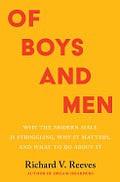



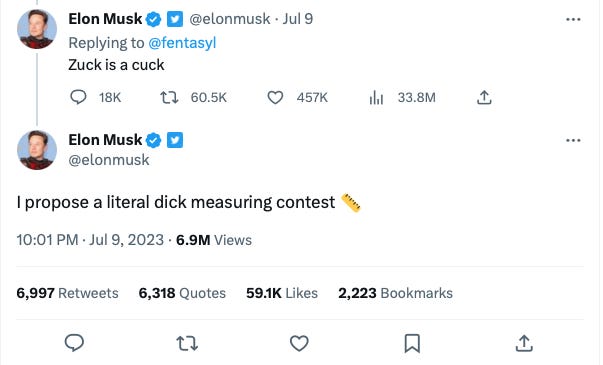

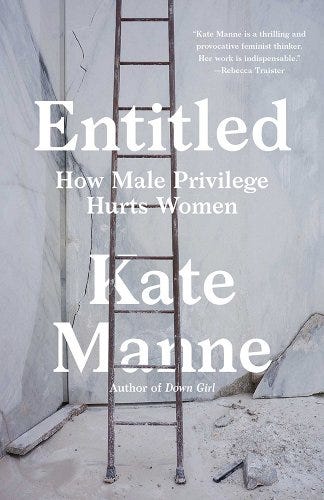

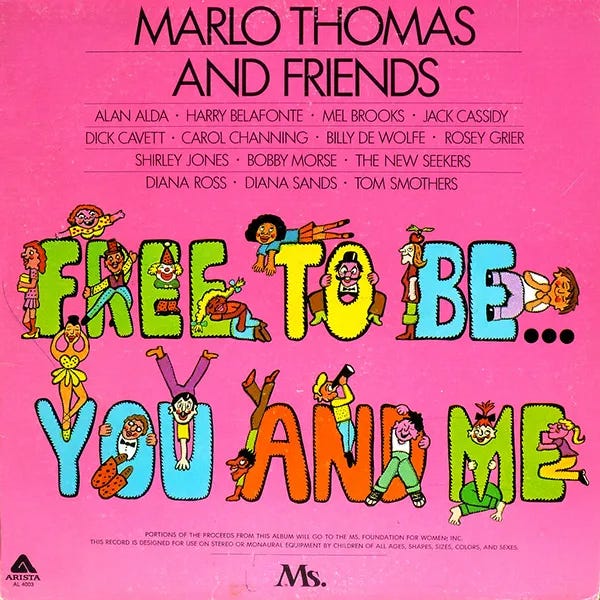

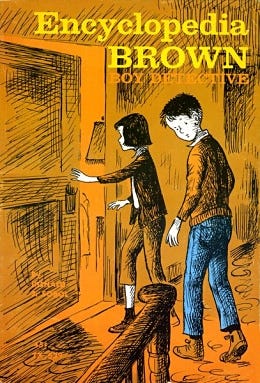
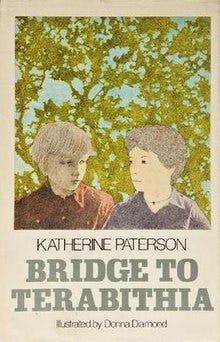
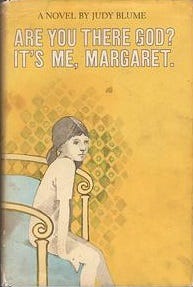
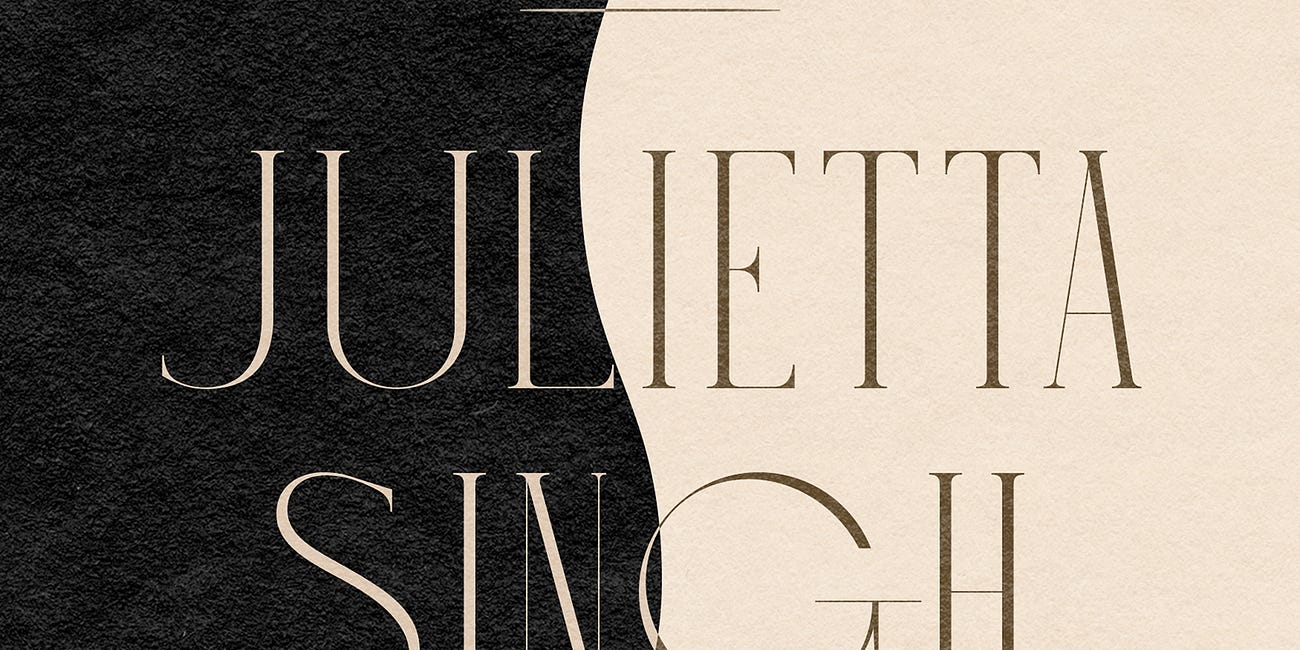
Both Musk and Zuckerberg have made public announcements that they have Asperger syndrome. That seems to add another layer to the conversation.
I think of the Greatest Generation, the quiet Midwestern WWII veteran. The great-grandpas now. This proposed “masculinity” that we see offered today is so completely foreign to these folks--and yet we are supposed to believe that masculinity is this eternal unchanging thing.
Every time I see some dude on the internet talk about Founding Fathers, I think, “You mean the portly guys with the stockings and the powdered wigs?”
A brilliant and honest analysis, john. I greatly admire that.